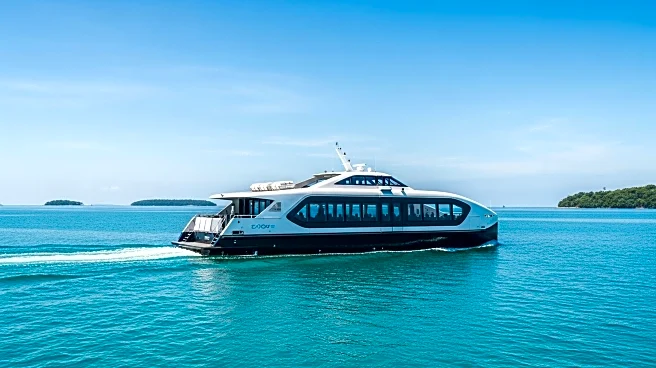What is the story about?
What's Happening?
Norwegian startup Hydrolift Smart City Ferries AS, known as Hyke, is set to launch at least 10 autonomous electric passenger shuttles across Southeast Asia by 2027. The initiative targets the Philippines and Singapore as initial markets, aiming to decarbonize maritime transport. Hyke's vice-president for sales, Charles Pembroke-Birss, highlighted the growing demand for sustainable mobility solutions in Asia. The Philippines and Singapore have committed to achieving net-zero emissions by 2050, aligning with the International Maritime Organization's decarbonization goals. Hyke has partnered with Singapore-based marine engineering firm Seagull Pte. Ltd. for vessel manufacturing, while Hyke will provide autonomous systems, training, and operational support to ensure compliance with regional regulations and safety standards.
Why It's Important?
The launch of Hyke's electric ferries represents a significant step towards reducing carbon emissions in maritime transport, a sector traditionally reliant on fossil fuels. By introducing autonomous electric shuttles, Hyke aims to cut operational costs by 50% and energy consumption by 85% compared to diesel-powered vessels. This initiative supports the broader environmental goals of the Philippines and Singapore, potentially setting a precedent for other countries in the region. The move could stimulate further investment in sustainable transport technologies, fostering innovation and collaboration between international and local firms.
What's Next?
Hyke plans to begin pilot operations in the Philippines by the end of 2025, with production planning underway for both Singapore and the Philippines. The success of these pilot programs could lead to expanded operations across Southeast Asia, encouraging other countries to adopt similar sustainable transport solutions. Stakeholders, including government agencies and environmental groups, are likely to monitor the project's progress closely, assessing its impact on emissions reduction and maritime transport efficiency.
Beyond the Headlines
The introduction of autonomous electric ferries could have broader implications for the maritime industry, potentially influencing regulatory frameworks and safety standards. As autonomous technology becomes more prevalent, there may be shifts in employment patterns within the sector, with a focus on technical and operational roles. Additionally, the integration of solar power and energy-efficient designs in ferry construction could inspire similar innovations in other transport modes, contributing to a more sustainable global transport network.















